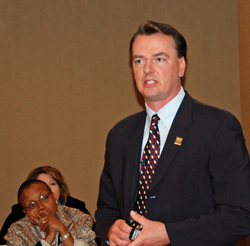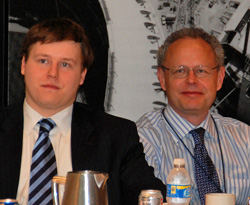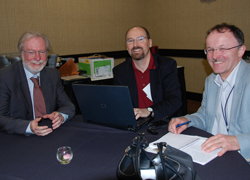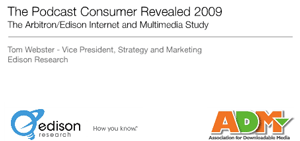UC-Davis Air Quality Extension Specialist Dr. Frank Mitloehner presented his views on animal agriculture and climate change during the World Ag Congress last week in St. Louis, and then followed up with a presentation on sustainability in livestock production during a roundtable presented by Novus International.
 Dr. Mitloehner talked about the United Nations report that claimed livestock produce more greenhouse gases than all transportation. “This has been a very controversial report,” he said. “You can’t take these global numbers and apply them regionally. That’s one of the big issues.”
Dr. Mitloehner talked about the United Nations report that claimed livestock produce more greenhouse gases than all transportation. “This has been a very controversial report,” he said. “You can’t take these global numbers and apply them regionally. That’s one of the big issues.”
He says that increasing efficiency in livestock production is already decreasing greenhouse gas emissions, comparing the efficiency of dairy cows in the United States between 1944 and 2007. “To produce one billion kilograms of milk in 2007, we need 20 percent less cows, 25 percent less feed, 10 percent less land. In 2007, we produced 40 percent less methane and 56 percent less nitrous oxide compared to 1944. The reason for that is improved efficiency, and these are huge gains.”
He believes that while livestock production may be part of the problem in some regions, it can be part of the solution by producing energy from manure. “I come from a village in Germany that decided five years ago to establish a very large digester, which is fed with animal manure, food waste, green clippings and other residue. It produces methane, which is burned, the heat from the burning heats up a water tower, the heated water goes through a pipeline system into every home in the village and the power that is generated is used to power the entire village. This village is now the first one in the world that is off the grid.” Mitloehner says they are working on a similar project at UC-Davis.
During the Novus roundtable, it was brought out that the issues of climate change, sustainability and animal welfare are all tied together and provide both challenges and opportunities for the livestock industry. Mitloehner says producers need to confront the issues and be proactive.
You can listen to Frank Mitloehner’s opening remarks during the climate change session at the World Ag Congress: waf-09-mitloehner.MP3
Flickr Photo Album for World Ag Forum
AgWired coverage of the 2009 World Agricultural Forum World Congress is sponsored by:
 .
.


 At the conclusion of the World Ag Congress in St. Louis last week,
At the conclusion of the World Ag Congress in St. Louis last week, 
 Dr. Mitloehner talked about the United Nations report that claimed livestock produce more greenhouse gases than all transportation. “This has been a very controversial report,” he said. “You can’t take these global numbers and apply them regionally. That’s one of the big issues.”
Dr. Mitloehner talked about the United Nations report that claimed livestock produce more greenhouse gases than all transportation. “This has been a very controversial report,” he said. “You can’t take these global numbers and apply them regionally. That’s one of the big issues.” Syngenta Crop Protection has redesigned the online face of the company,
Syngenta Crop Protection has redesigned the online face of the company,  The workshops give agricultural aviators a chance to gather each year to test their equipment and learn about new developments in application technologies to ensure they are applying crop protection products evenly, efficiently and safely. Analysts with the Operation Self-Regulating Application and Flight Efficiency (S.A.F.E.) from across the country conduct these workshops in conjunction with state agricultural aviator associations.
The workshops give agricultural aviators a chance to gather each year to test their equipment and learn about new developments in application technologies to ensure they are applying crop protection products evenly, efficiently and safely. Analysts with the Operation Self-Regulating Application and Flight Efficiency (S.A.F.E.) from across the country conduct these workshops in conjunction with state agricultural aviator associations. Last week’s World Agricultural Forum World Ag Congress attracted a great crop of journalists, both locally and internationally. Pictured here interviewing keynote speaker Paul Collier (left) are two leaders of the
Last week’s World Agricultural Forum World Ag Congress attracted a great crop of journalists, both locally and internationally. Pictured here interviewing keynote speaker Paul Collier (left) are two leaders of the  I missed the Association for Downloadable Media’s webcast titled, “The Podcast Consumer Revealed.” The session was conducted by Tom Webster, Edison Research. The audience for podcasting just keeps growing. The main reasons people watch or listen to podcasts is so they can do so whenever and wherever they want. Here are some key points from the session.
I missed the Association for Downloadable Media’s webcast titled, “The Podcast Consumer Revealed.” The session was conducted by Tom Webster, Edison Research. The audience for podcasting just keeps growing. The main reasons people watch or listen to podcasts is so they can do so whenever and wherever they want. Here are some key points from the session. A few months ago, I signed up for a half-marathon with my sister, Courtney. To boost our motivation, we joined
A few months ago, I signed up for a half-marathon with my sister, Courtney. To boost our motivation, we joined  This was my first half marathon, and I was proud to hear my name called as I crossed the finish line, announcing that I was running in support of beef. My jersey proudly said, “Beef, it’s what’s for dinner,” and it earned me quite a few comments and cheers throughout the race. Although my muscles were sore from the intensity of the race, my heart was proud of myself for finishing the race within my goal time.
This was my first half marathon, and I was proud to hear my name called as I crossed the finish line, announcing that I was running in support of beef. My jersey proudly said, “Beef, it’s what’s for dinner,” and it earned me quite a few comments and cheers throughout the race. Although my muscles were sore from the intensity of the race, my heart was proud of myself for finishing the race within my goal time.  It looks like
It looks like  Woodruff Sweitzer will partner with BIVI to develop strategic plans, advertising, sales materials and collateral for major swine vaccines (Ingelvac CircoFLEX®, Ingelvac MycoFLEX®, Ingelvac® PRRS and Enterisol® Ileitis). Beginning in July 2009, True Media will manage the media planning and buying, which is focused primarily on Web and professional trade publications.
Woodruff Sweitzer will partner with BIVI to develop strategic plans, advertising, sales materials and collateral for major swine vaccines (Ingelvac CircoFLEX®, Ingelvac MycoFLEX®, Ingelvac® PRRS and Enterisol® Ileitis). Beginning in July 2009, True Media will manage the media planning and buying, which is focused primarily on Web and professional trade publications.